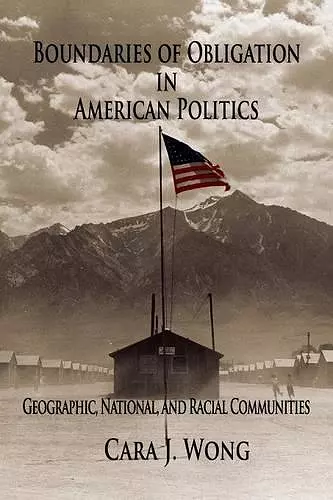Boundaries of Obligation in American Politics
Geographic, National, and Racial Communities
Format:Paperback
Publisher:Cambridge University Press
Published:8th Mar '10
Currently unavailable, and unfortunately no date known when it will be back
This paperback is available in another edition too:
- Hardback£75.00(9780521871327)

Based on analysis of eight national surveys, this book examines how people's definition of community shapes their views on governmental redistributive policies.
Based on analysis of three types of communities and eight national surveys, this book examines how ordinary Americans imagine their communities. Wong concludes that people's definition of their community and delineation of its boundaries shape their views on governmental redistributive policies.This book shows how ordinary Americans imagine their communities and the extent to which their communities' boundaries determine who they believe should benefit from the government's resources via redistributive policies. By contributing extensive empirical analyses to a largely theoretical discussion, it highlights the subjective nature of communities while confronting the elusive task of pinning down 'pictures in people's heads'. A deeper understanding of people's definitions of their communities and how they affect feelings of duties and obligations provides a new lens through which to look at diverse societies and the potential for both civic solidarity and humanitarian aid. This book analyzes three different types of communities and more than eight national surveys. Wong finds that the decision to help only those within certain borders and ignore the needs of those outside rests, to a certain extent, on whether and how people translate their sense of community into obligations.
“Geography matters for political behavior and it matters through people’s perceptions of it. In Boundaries of Obligation in American Politics, Cara Wong demonstrates this fundamental aspect of politics through deep and detailed attention to theory and careful data analysis. This book is a major contribution to our understanding of race relations and political life in the United States. It brings important fresh insights to our understanding of contextual effects in the realm of political thought and action. We will be learning and drawing inspiration from this book for years to come.” —Katherine Cramer Walsh, University of Wisconsin-Madison
“Wong has written an important book that will surely be of interest across the social sciences. The larger issues she explores, through the creative use of national public opinion survey data, are the way social groups define their boundaries, determining insiders and outsiders, and how these definitions in turn delimit feelings of obligation. For scholars interested in the dynamics of group identity, inter-group relations in increasingly diverse societies and their implications for public policy and social equity, this book is a must-read.” —Michael Jones-Correa, Cornell University
“Boundaries of Obligation offers a compelling account of the central role of ‘community’ in American political life. Perceptions of who is in and who is not, and what those bonds demand and barriers preclude, profoundly shape public opinion on redistributive policies. This ambitious study, informed by theoretical insights drawn from a range of separate research traditions and grounded in the rigorous analysis of extensive national survey data, reveals how and why imagined boundaries of race, nation and geography become politically consequential. Wong’s research sparkles with new insights and deepens our understanding of politics as practiced by ordinary Americans. This book is sure to be widely read.” —Claudine Gay, Harvard University
“Boundaries of Obligation provides nothing less than a new way to think about American politics and the world beyond our borders. Anyone who has puzzled over a claim about who counts as a “true American,” or who hopes that Americans might care more about world hunger or global warming, will want to read this book. Wong makes it crystal clear that our sense of community can rise above the identifications of race, citizenship, and where we live. Most important, this book shows that these boundaries of obligation explain our political actions above and beyond our interests, prejudices, and ideologies. Wong proves that we need to ask where people draw the lines around their communities. All researchers interested in racial politics, ethnic conflict, political participation and philosophical ideas about community and obligation will want to read this exciting and timely new book.” —Lynn Sanders, University of Virginia
ISBN: 9780521691840
Dimensions: 226mm x 150mm x 18mm
Weight: 380g
286 pages